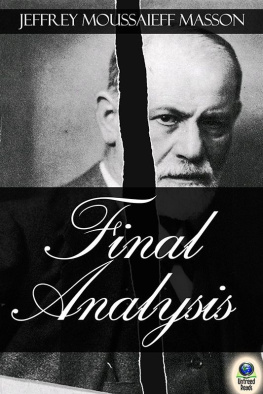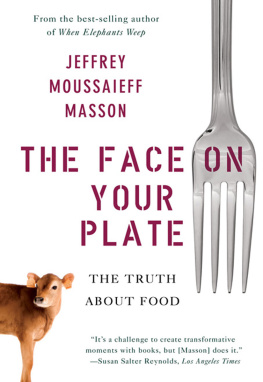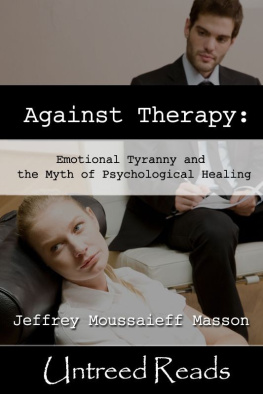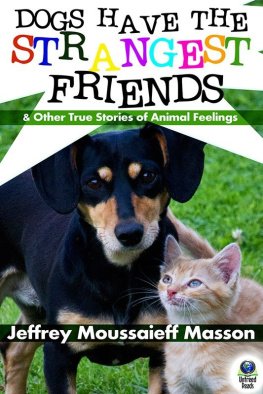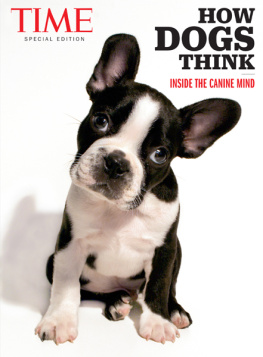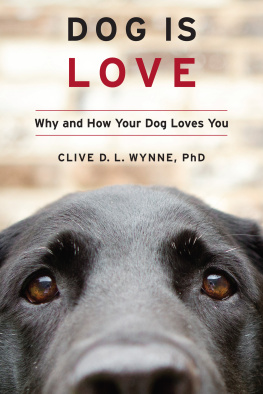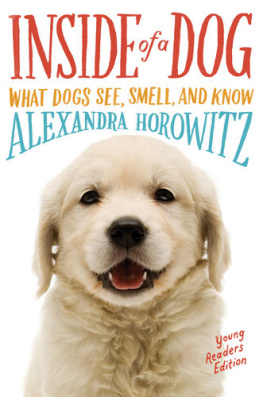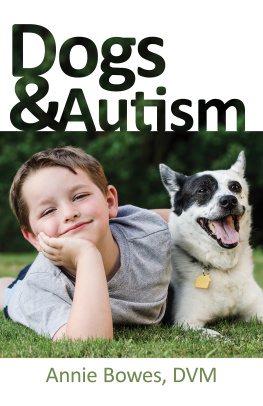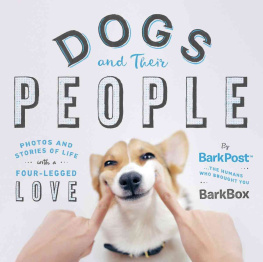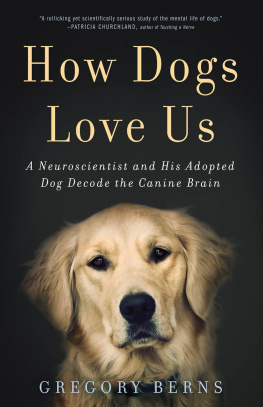THE DOG
WHO COULDNT
STOP LOVING
HOW DOGS HAVE CAPTURED OUR HEARTS
FOR THOUSANDS OF YEARS

JEFFREY MOUSSAIEFF MASSON

For Benjy
CONTENTS

F or the past twenty years, I have been striving to see the world from an animals point of viewsometimes I think I start to feel like one of them! Several books about the emotional lives of animals have resulted from this journey. Some have dealt with animal emotions in general (When Elephants Weep), others with the emotional life of a particular species (Dogs Never Lie About Love, The Nine Emotional Lives of Cats).
When I wrote about farm animals and the problems with domestication (The Pig Who Sang to the Moon), I was attempting to see if the insights I had gained about wild animals and companion animals could also be applied to domesticated animals we kept on farms. Did they too have emotional lives of some depth, I wondered? In The Emperors Embrace (retitled in paperback The Evolution of Fatherhood), I tried to tackle the issue of how evolution played out in fatherhood among animals, but began to feel there was something eluding me. I turned to domesticated companion animals (dogs, cats, rabbits, chickens, and rats) for my book Raising the Peaceable Kingdom, but again I felt something important was there just beyond my grasp.
Something lay at the heart of domestication that I could feel but could not yet put into words. I tried to look at the darker aspects of domestication in my most recent book, The Face on Your Plate, and I think I did succeed in understanding the unhappy lives of so-called food animals. In a scattered attempt to put my finger on the amazing diversity that characterizes the animal world, I wrote a book about my 100 favorite animals (little realizing how much work was involved), called Altruistic Armadillos, Zenlike Zebras. It was fun to write, and instructive, but still, something was missing. There had to be more; there had to be something that was different, that gave some evidence of the better impulses in the human species, something that explained our empathy, our sympathy, and even our compassion for members of a different species. I knew there had to be, because the feelings I had for some of the animals I lived with were unusually intense. When I thought back on these feelings, I saw that they almost always involved dogs.
Ever since I was a child, and continuing as an adult, I had puzzled over, and also marveled at, the relationship I (and others like me) had with dogs. Was there, in fact, something special about this, and only this, relationship? And if so, could it have a historical dimension? That is, could it be ancient, with roots reaching far back into human history? It seemed pure speculation, until a series of recent discoveries opened up the possibility that dogs and humans had a shared history of, at minimum, 15,000 years, and possibly far beyond. Many scientists had settled upon 40,000 years as the most likely compromise date for the beginning of relations between humans and wolves turning into dogs.
Whatever the date, it seemed something quite extraordinary happened to the human species, propelling us on a warp-speed evolutionary path that has taken us to the present. It struck me as remarkable, and highly suggestive, that at the very moment when humans were domesticating wolves into dogs, humans themselves were still in the throes of domestication, shedding their biological skins and being transformed by the culture they were building around them. This raised the striking possibility that it was partly through our association with dogs that we went from primitive humans to Homo sapiens.
The Harvard biologist E. O. Wilson has proposed what he calls the biophilia hypothesis: that we possess an inborn, species-typical tendency to affiliate with other animals. I agree that we do make these connections with other animals and derive great pleasure from so doing. We are unique in this respect. But are we wholly unique? As I thought about this question, I was finally able to put my finger on what had teased and eluded me for so long: that there was something different about one animal species, something they shared with us more than they did with their fellow nonhuman animals. That species was the dog, and what they shared with us so uniquely was their capacity for love. So yes, another book on the emotional lives of animalsa book that takes E. O. Wilsons hypothesis and gives it a new twist. Not only have dogs and humans influenced each other for tens of thousands of years, they have done so in far more profound ways than any other two species on earth, and primarily in the direction of acting on the capacity for love in all its different manifestations, such as showing sympathy, feeling empathy, and expressing compassion.
What does it mean to say dogs make us human? It is a phrase that has been used on several occasions (for example, by Temple Grandin) in the last few years. I think it means something like: Through associating with dogs, we went from primitive humans to Homo sapiens. What would be a good analogy? That through association with humans, Canis lupus (wolf) became Canis lupus familiaris (dog). It worked both ways.
This is a hypothesis. It is the nature of this problem that it can never be proven. More evidence may make it more likely, but its value will need to be restricted to its evocative and explanatory power. Does it help us understand certain human and canine mysteries? Many people bond with dogs in more profound ways than with any other species. Why is this bondand this bond onlyunique among all the attachments humans are capable of forming, parallel only to the attachment we feel for our own children?
Why, of all animals, does the dog follow us, or rather accompany us, wherever we go on earth, from the tropical rainforests to the frozen icescape of the far Arctic? Why are there no tribes, no countries, no societies, not even villages, without dogs? Nowhere in the world are dogs absent.
Why is it that people have the capacity to befriend animals who are willing to take a chance and come into our intimate orbit, when no other animal on earth will do soonly dogs? Because a long time ago, in the words of Konrad Lorenz, man met dog. (Though it was probably more likely that long ago, 40,000 years ago or more, woman met dog. To this day, dogs by and large prefer women to men.)
The great Stanford anthropologist Richard Klein has long argued that something very significant happened to humans about 50,000 years ago. It has been called the dawn of human culture, or human revolution, a creative explosion, or a sociocultural big bang. He explains that the relationship between anatomical and behavioral change shifted abruptly about 50,000 years ago. Everything was suddenly put on fast-forward: language, culture, and the ability to innovate. Something, he thinks, changed at a neural level. What was new? Suddenly there are cave paintings where there had been none before, in France, in Spain, in Italy, but also in the Middle East and Australia. There was colorvivid, bright colors. There were rainbow serpents, for example, when before there were none. There were sculptures. Even human language, the way we know it today, sophisticated and capable of a million permutations, may have reached its apogee then. Weapons became more sophisticated. Beads that were hard to make were used as symbols. The very
Next page

